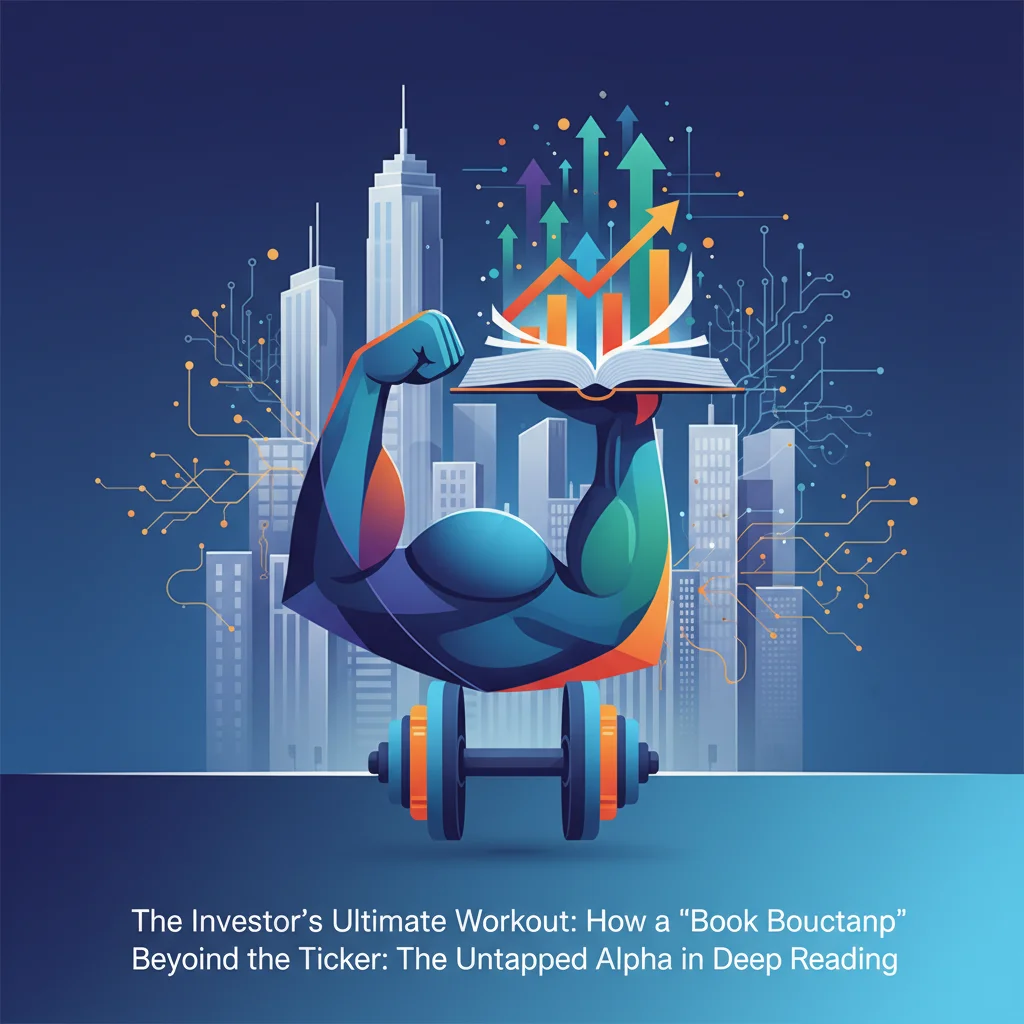
The Investor’s Ultimate Workout: How a ‘Book Bootcamp’ Fortifies Your Financial Acumen
Beyond the Ticker: The Untapped Alpha in Deep Reading
In the relentless world of finance, the pursuit of an edge is constant. We subscribe to premium data feeds, analyze quarterly earnings with forensic precision, and track macroeconomic indicators in real-time. We’re conditioned to believe that the next great insight lies in the next data point, the next news alert, the next flicker on the stock market ticker. But what if the most potent competitive advantage isn’t found on a screen, but between the pages of a book?
The concept of intensive, structured reading—a “Book Bootcamp,” as an insightful piece from the Financial Times describes it—is gaining traction not as a leisurely pastime, but as a rigorous mental workout. For investors, business leaders, and finance professionals, this approach can transform “literary fitness” into tangible financial acuity. It’s about moving beyond the noise of the daily news cycle to build a deep, resilient intellectual framework that can withstand market volatility and identify opportunities others miss. This isn’t about simply reading more; it’s about reading with purpose, intensity, and a strategic goal: to fundamentally upgrade your thinking.
While daily market news is essential for tactical awareness, it often lacks context and encourages reactive, short-term thinking. Deep reading of history, psychology, science, and philosophy builds the foundational “mental models” that legendary investors like Charlie Munger champion. These models are frameworks for understanding how the world works. Reading about the fall of the Roman economy, for example, provides a richer understanding of debt cycles, currency debasement, and systemic risk than a dozen analyst reports on modern inflation. It’s this breadth of knowledge that allows you to connect disparate dots and develop a truly contrarian perspective, which is often where the greatest alpha is found.
The Cognitive Gym: Building Your Defenses Against Market Psychology
The financial markets are not just a reflection of fundamentals; they are an arena of human psychology. Fear, greed, herd mentality, and a host of cognitive biases are the invisible forces that drive bubbles and crashes. A Book Bootcamp is your training ground to recognize and counteract these irrational impulses, both in the market and within yourself.
According to research in behavioral economics, investors consistently underperform the market precisely because of these biases. A study highlighted by the CFA Institute, for example, notes that biases like overconfidence and confirmation bias lead to suboptimal trading decisions and poor risk management (source). Reading deeply in psychology and sociology inoculates you against these pitfalls. Studying Daniel Kahneman’s “Thinking, Fast and Slow” or Richard Thaler’s “Nudge” does more for your long-term returns than memorizing technical chart patterns. You learn to question your gut reactions, identify when you’re falling prey to a popular narrative, and make decisions based on probability and logic rather than emotion.
A bootcamp focused on the history of financial manias—from the Dutch Tulip Bubble to the dot-com bust—trains your pattern-recognition abilities. When you see the same euphoric language and “this time it’s different” arguments emerging around a new asset class or fintech innovation, your historical knowledge acts as a powerful brake on impulsive investing. You develop an intellectual antifragility, becoming more robust and opportunistic in the face of market chaos.
Designing Your Personal Finance & Investing Bootcamp
The power of a bootcamp lies in its structure and intensity. It’s a deliberate project, not a casual reading list. Here’s a framework for building your own:
- Define Your Mission: What specific area of knowledge do you want to master? Your goal shouldn’t be “read more about finance.” It should be specific, such as “Understand the technological and economic implications of decentralized finance (DeFi)” or “Master the psychological principles of behavioral investing.” A clear objective guides your book selection and keeps you focused.
- Curate Your Curriculum: Select 5-7 books that approach your topic from different angles. Include a foundational text, a historical perspective, a critical or contrarian view, and a forward-looking analysis. The goal is a 360-degree understanding, not an echo chamber. A report by McKinsey emphasizes that learning agility—the ability to learn, unlearn, and relearn—is a key predictor of leadership success in our volatile world (source). A diverse curriculum is a direct investment in this skill.
- Set the Rules of Engagement: Treat it like a serious course. Allocate a specific time each day or week. Decide on your output: Will you write summaries, discuss the concepts with a colleague, or apply one key idea to your portfolio each week? The FT article notes that the key is to avoid it feeling like “homework.” The structure should create momentum, not dread.
To illustrate, here is a sample bootcamp curriculum focused on a critical area of modern finance:
| Book Title | Author | Core Theme & Relevance |
|---|---|---|
| The Innovator’s Dilemma | Clayton M. Christensen | Foundational Theory: Understand the mechanics of disruptive innovation and why established players in banking and finance are vulnerable. |
| Digital Gold | Nathaniel Popper | Historical Context: Explore the origins of Bitcoin and the ideological and technological roots of the blockchain revolution. |
| The Age of Surveillance Capitalism | Shoshana Zuboff | Critical Perspective: Analyze the data-driven business models underpinning much of modern fintech and their societal implications. |
| Doing Digital | Chris Skinner | Practical Application: Gain insights into the strategies and challenges of digital transformation within the financial services industry. |
| The Sovereign Individual | James Dale Davidson & Lord William Rees-Mogg | Forward-Looking/Contrarian: A classic (if controversial) text predicting how technology will empower individuals and disrupt traditional power structures, including the state’s control over money. |
From Latticework to Action: Integrating Your New Knowledge
The ultimate goal of a Book Bootcamp isn’t to win a trivia night; it’s to make better decisions. The knowledge you gain from disparate fields must be woven into what Charlie Munger calls a “latticework of mental models.” This is the process of taking a concept from one domain and applying it to another.
For example, understanding the biological concept of “emergence” (how simple systems create complex behavior) from a science book can provide a new lens for viewing the stock market. You stop seeing it as a machine to be predicted and start seeing it as a complex adaptive system, leading to a more humble and probabilistic approach to investing. Similarly, insights from a book on military strategy can inform your competitive analysis of companies in the crowded financial technology space.
The key is active integration. After reading a chapter, pause and ask: “How does this concept apply to my current portfolio? How does it challenge my assumptions about the economy? How can I use this to ask better questions in my next meeting?” This active, deliberate practice is what converts passive knowledge into active wisdom and, ultimately, a sustainable competitive edge.
Conclusion: Your Most Valuable Asset
In a data-saturated world, information is a commodity. Wisdom, however, is scarce and immensely valuable. A Book Bootcamp is a strategic, disciplined investment in cultivating that wisdom. It’s an acknowledgment that the most powerful analytical tool you will ever have is your own mind, and like any high-performance asset, it requires rigorous, consistent, and intelligent training.
By stepping away from the screen and engaging in deep, structured reading, you build the cognitive architecture needed to navigate the complexities of the modern financial landscape. You develop the historical perspective to see cycles where others see chaos, the psychological insight to remain rational when others panic, and the multidisciplinary frameworks to innovate where others see roadblocks. This is more than professional development; it is the ultimate workout for fortifying your financial acumen and securing your intellectual alpha for the long term.


